- Home
- Parnell Hall
A Clue for the Puzzle Lady Page 6
A Clue for the Puzzle Lady Read online
Page 6
Cora Felton was gone.
11
The crime scene looked different today. Yesterday, in the pouring rain, Chief Harper could barely see a thing. Today, the sun was out, the sky was crystal clear, and the whole Bakerhaven Cemetery stretched out ahead of him, rows and rows of gravestones winding around the side of the hill.
Chief Harper drove through the open gate and up the dirt road. He could see the caretaker’s truck in the far northwest corner of the cemetery, parked next to a small maintenance shed. He drove over, found Fred Lloyd inside the shed working on a power mower. The caretaker was lying on his back, tightening something with a small wrench.
“Lawn mower break down?” Chief Harper asked.
“All the time.”
“Bad machine?”
“Just old.” Fred Lloyd gave the bolt a final turn, rolled aside, and sat up. “I told you, I don’t know the girl. What do you want?”
“I just wanted to ask you some questions when it wasn’t so wet.”
“I was in yesterday. Gave a signed statement.”
“I know. I read it. I still have some questions.”
“Well, the answers are the same. I don’t know her.”
“I’m sure you don’t. That’s not what I was going to ask. Let’s go back to the beginning. Yesterday morning you drove in here and saw the girl in your headlights.”
“That’s right. Otherwise I might have missed her in the rain.”
“What time was that?”
“Seven-thirty in the morning.”
“That’s when you start work?”
“That’s right.”
“Why so early?”
“Some people like to come by the cemetery on their way to work.”
“So?”
“So, I have to open up.”
“What do you mean, open up?”
“The gate. I have to unlock the gate.”
“The cemetery’s locked at night?”
“Of course.”
“And you unlock it every morning at seven-thirty?”
“That’s right.”
“What time do you lock it in the evening?”
“I don’t.”
“You don’t?”
“No.”
“Why not?”
“I’m not here. I go home at three.”
“So who locks up at night?”
“Huey.”
“Who’s Huey?”
“The late shift. I’m the early shift, he’s the late shift.”
“So what time does Huey lock up?”
“Seven o’clock.”
“Seven?”
“That’s right. The place shuts down at seven.”
“You know the procedure for locking up?”
“Yes, of course.”
“But you don’t do it.”
“I’ve done it. When Huey’s sick or out of town I’ve done double duty. Just like he’s covered for me.”
“But not last night.”
“No. No, last night he was on. He’d have locked up at seven.”
“And what is the procedure for locking up?”
“Make sure everybody’s out. That’s the main thing. You lock the gate with someone’s car inside, there’s hell to pay.”
“Has that ever happened?”
“Sure. Southeast corner there’s a couple of sections people pull off to the side and park, you wouldn’t know they were there. I remember comin’ to work one morning there’s a Cadillac parked next to the gate. I mean, inside the gate.”
“What did the driver say?”
“The driver wasn’t there. He’d left the car and gone home. He said a lot when he showed up, though. Which wasn’t fair. I hadn’t locked him in. Plus the guy was blockin’ me. And who said he had to leave his Caddie right in front of the gate so’s I couldn’t get my truck in, can you tell me that?”
“No, I can’t,” Chief Harper said. “But, aside from making sure everyone’s out, what else can you tell me about locking up?”
“That’s about it. You lock the shed here, make sure the mowers and the tools are away. And you lock the front gate with a chain and padlock.”
“Where are the chain and padlock?”
“Chained to the gate. You think I wanna lug it around, maybe lose it, put it someplace Huey can’t find? Beginning of the day, you lock the chain to the gate, at night you lock the gate shut.”
“So, if someone wanted to get into the cemetery after seven o’clock at night …?”
“They would climb over the fence. Not that hard to do. Happens all the time. It’s mostly kids, teenagers who think it’s cool to party in the cemetery. I’ll come in the morning, find the beer cans and the cigarette butts. That’s why, when I drove in and saw the girl lying there, my first thought was she’d had too much to drink.”
“I see.”
Fred Lloyd cocked his head. Looked at the chief narrowly. “You gonna ask me about condoms?”
“Condoms?”
“Yeah. Along with the beer cans and cigarettes, did I ever find condoms too?”
“Did you?”
“Can’t say as I did.”
Chief Harper frowned. “Then why did you bring it up?”
The caretaker shrugged. “Well, you’re askin’ everything else the reporter asked, I figured you’d ask that too.”
“Reporter?”
“Yeah.”
“You’ve had a reporter around asking questions?”
“Didn’t I just say that?”
“You mean this morning?”
“Sure, this morning. Just before you. That’s why it’s so funny to hear you askin’ the same thing.”
“Was this Aaron Grant?”
“Who?”
“The reporter. Was it Aaron Grant? Young kid, early twenties.”
“No, this was a woman.”
“A woman?”
“Yeah. In fact, she may be still here. I didn’t see her drive out.”
“You told this woman just what you told me?”
“That’s right.”
“Anything else?”
“No. Just …”
“Just what?”
“Where the grave was. You know, where I found the girl. You didn’t ask that ’cause you already know.”
“I certainly do,” Chief Harper said. “Why’d she have to ask? Couldn’t she see the crime scene ribbon?”
The caretaker shook his head. “Isn’t there.”
“What?”
“Someone took it down. Kids, most likely. I got here this morning, ribbon’s gone.”
“Great,” Harper said. He turned and strode off through the cemetery. It bothered him, the crime scene ribbon being gone. Not that it mattered, in terms of the investigation. It was just another example of no one taking his authority seriously.
He also wondered if he’d be able to recognize the grave without the ribbon around it.
He needn’t have worried. The reporter was still there. She wore a broad-brimmed brown felt hat that obscured her hair and most of her face, and a pair of large sunglasses. She was kneeling down, examining the gravestone.
While she was doing so he walked up behind her and said, “May I help you?”
The woman gave a start, turned around and looked up. She recognized Chief Harper and smiled.
“Hello, Chief,” she said. “Nice to see you.”
Chief Harper blinked. The woman looked vaguely familiar, but with her hair tucked into her hat and her sunglasses on it was hard to tell.
He blinked again.
It was Cora Felton.
12
“What are you doing here?”
Cora Felton brushed the dirt from her hands as she got to her feet. “It’s still a little muddy, isn’t it? Of course, what would you expect with all that rain.”
“Excuse me, but why are you here?”
“Well, I have to see for myself, don’t I? You can’t expect me to solve the crime without all the facts.”
&n
bsp; “I didn’t ask you to solve the crime. I asked you to interpret a clue.”
She smiled. “Which amounts to the same thing. In any case, you can’t expect me to do anything without all the facts.”
“I gave you the facts.”
She put up her hand. “Oh, well, now I’m sure you think you did, Chief. But you must understand what you gave me was your interpretation of the facts. I need to see these things for myself.”
“You don’t need to see these things at all.”
“No? Then tell me something, Chief. What’s the name on this gravestone?”
“I have no idea.”
“There you are. If you don’t have the facts, how can I judge what you tell me? For your information, this is the grave of Emily Klemper, beloved wife of Jonathan Klemper, who died in nineteen fifty-eight. Emily, not Jonathan. He died in nineteen fifty-four. His grave’s over there.”
“Then what were you looking for?”
“Huh?”
“You’ve already examined these gravestones. I mean, you must have if you know the husband’s buried over there. Because you’d examine this one first. Find the name, and look for relatives. So, if you’ve already examined this gravestone, what were you looking for just now?”
“A clue.”
“I figured that. Anything in particular?”
“I was hoping for something that would tie in with the clue we already have.”
“The one on the front page of the morning paper?”
Cora Felton frowned. “Huh?”
“You didn’t see the paper this morning?”
“I’ve been busy.”
“So I see. For your information, your picture’s on the front of the Bakerhaven Gazette, under the headline CROSSWORD CLUE.”
“That’s not good.”
“No kidding.”
“You get so much further with people if they don’t know what you’re after.”
It took a moment for that to register. “I don’t think you understand me, Miss Felton. The problem with the story is not that it will hamper your investigation, it’s that it will put you in danger.”
Cora Felton smiled. “I don’t think I’m in any danger.”
“Oh, no? You come snooping around the crime scene, first thing in the morning. The only person here is the caretaker, and he’s busy working on a mower. Suppose the killer was lurking around?”
Cora Felton’s eyes twinkled. “That’s very interesting, Chief. The killer returns to the scene of the crime. You happen to read a lot of detective fiction?”
Chief Harper was not amused. “It’s not funny,” he said. “It’s serious. If you’re going to run around posing as a reporter—”
“I never said I was a reporter. If the caretaker got the wrong idea, that’s hardly my fault.”
“You’re missing the point. You shouldn’t be talking to the caretaker in the first place.”
“I think you’re missing the point, Chief. Have you examined this grave? Obviously not, if you don’t know whose it is.”
“What about it?”
“There was no clue in the name, but look at its position.”
“Position?”
“Yes. Look where the road goes.” She pointed to the dirt road that came up from the gate and bisected the cemetery. “See where the road forks left to go up to the caretaker’s shed? At the same time it forks right to go over to the graves on the east side of the hill?”
“Yeah. So?”
She pointed. “Well, it’s hard to see from here, but the road running east-west is right up there. And if you count down from the road—one, two, three, four.” She spread her arms, smiled. “Well, this is the fourth gravestone in the row.”
He looked at her. “Four down?”
“It’s possible.”
“What about queue?”
“It’s possible too. There are a number of possibilities. It’s too early to throw anything out yet. But here’s the problem.” She pointed again to the road coming up from the gate. “If you look at the road over there and count this way, well, this is the third row over. Which is wrong, if we take the message to mean the fourth grave in row five. This is actually the fourth grave in row three.”
“And what do you make of that?” Chief Harper said. And felt angry with himself for asking. He shouldn’t be discussing this with the woman, he should be kicking her out of there and telling her never to come back.
“It would seem to indicate that our premise was wrong. That four down line five did not indicate the gravestone where the girl was found. That leaves two other possibilities.”
“Two?”
“Yes. One, you take the premise that four down means four down from the road. Like I said before. If this is line three, then line five is two graves over. Which would make four down line five the grave just on the other side of her husband’s.” She consulted a small notebook in her hand. “Which happens to belong to a Morton Pressman, who died in nineteen forty-eight.” She nodded. “The second possibility—and the one that I like better—is that four down means starting from this grave. So, if you’d like to count with me,” she said, leading him along, “we go one, two, three, four down here, and then over two to line five. Which is the grave of Barbara Burnside, who died in eighty-four.”
“Oh,” Chief Harper said.
There was something in his voice.
Cora Felton looked at him. “What is it, Chief?”
“I knew Barbara Burnside. Went to school with her way back when. She died young. In an accident. Drove her car off the road. I was on duty at the time. Wasn’t chief, of course, just a cop. I responded to the call. Was there when they pulled her out.”
“An accident?” Cora Felton asked.
“Yes.”
“Was there anything about it—”
“No, there wasn’t,” Chief Harper said. “It was Saturday night, she’d been at a party, and she’d been drinking. Had a fight with her boyfriend and went home. She was driving drunk and angry and way too fast. Just one of those things.”
“So death was ruled accidental?”
“Death was accidental. Now, look. I know you’d like to make a mystery out of this. But I assure you, the dead girl has nothing to do with Barbara Burnside.”
“Uh huh,” Cora Felton said. She didn’t sound particularly convinced.
“But that’s not the point. The point is, you can’t be doing this. Running around crime scenes, looking for clues. That’s a matter for the police.”
“Sure, Chief. I wouldn’t want to step on your toes. Just let me know when you find the next clue.”
“If there’s another crossword puzzle clue, I assure you I’ll ask you about it.”
Cora Felton frowned. “Well, now. We were just discussing the fact it might not be a crossword puzzle clue. Suppose the puzzle did have to do with graves rather than letters. I would think you would want my help in figuring that out. Particularly since it’s my premise to begin with.”
Chief Harper thought that over. He didn’t like it, but didn’t feel like arguing. “If I find anything that supports that premise, I will let you know. In the meantime, Miss Felton, do you think you can handle the media?”
“I imagine I can do as well as you.”
Chief Harper flushed. “I wasn’t talking about stage presence. I understand you’re comfortable on camera. I mean, do you think you can downplay the puzzle angle of this crime? On the theory that’s the best way to foil the killer?”
“Yes, of course,” Cora Felton replied. “That’s all I wanted in the first place. Keep me in the loop, and I guarantee you I’ll do my best to keep out of the spotlight.” She shrugged. “Except …”
“Except what?”
Cora Felton smiled. “If I’m already on the front page of the paper, it’s not going to be easy.”
13
“Sherry, relax. I tell you, he’s not around.”
“Are you sure?”
“Sure, I’m sure. The band’s on tour. They�
��re in Washington or Philadelphia or something.”
“And Dennis is with them?”
“Of course he’s with them. Where else would he be?”
Sherry was on the phone with Brenda Wallenstein, her roommate from college. Brenda was an artist with a loft in SoHo. Before Sherry and Dennis had split up, Brenda had let his band use it as a rehearsal hall.
“How do you know they’re on tour?”
“They were through here last week. Debbie told me the itinerary.”
“They’re really working?”
“They’ve got gigs. Small-time, but paid.”
“It’s hard to think of anyone paying to see Dennis.”
“You didn’t always feel that way.”
“Don’t remind me.”
“So how’s small-town life treating you?”
“Great,” Sherry said. “Couldn’t be better. I’m getting annoying phone calls, there’s been a murder, and a local cop wants to involve my aunt.”
“How is Cora?”
“Cora’s Cora. I love her, but at times I’d like to strangle her.”
“And she’s on the front page of today’s paper?”
“Large as life. I nearly had a stroke.”
“I’ll bet. And this cop wants her to solve a murder?”
“No, he just wants her to interpret a crossword puzzle clue.”
Brenda snorted. “That’s a laugh.”
“No kidding. The poor cop. He thought he was getting the Puzzle Lady. Instead he’s unleashed a modern-day Miss Marple. You should have seen her eyes light up when she realized it was a murder. She’s out there snooping now.”
“Uh huh,” Brenda said. “You still haven’t answered my question.”
“What question?”
“About small-town life.”
“I thought I did.”
“Don’t be a goose. You met someone yet?”
“Brenda. I just got here.”
“You been there long enough to get a job.”
“I got lucky.”
“Oh? I thought you hadn’t been there long enough.”
“I was talking about the job.”
“I know you were. Haven’t you met anyone?”
“I’m teaching nursery school.”
“So?”

 Clicker Training
Clicker Training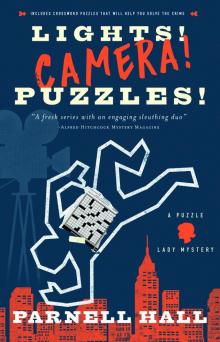 Lights! Camera! Puzzles!
Lights! Camera! Puzzles!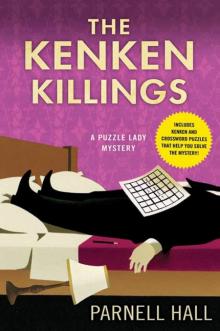 The KenKen Killings
The KenKen Killings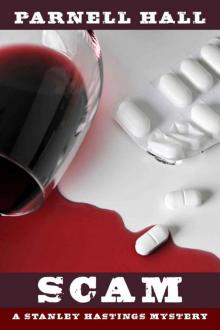 12-Scam
12-Scam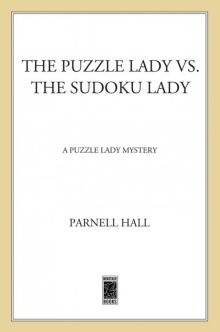 The Puzzle Lady vs. the Sudoku Lady
The Puzzle Lady vs. the Sudoku Lady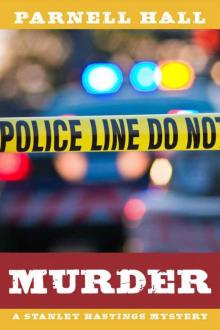 2 Murder
2 Murder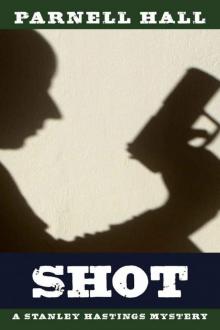 7 Shot
7 Shot You Have the Right to Remain Puzzled
You Have the Right to Remain Puzzled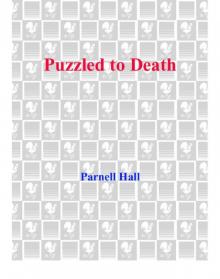 Puzzled to Death
Puzzled to Death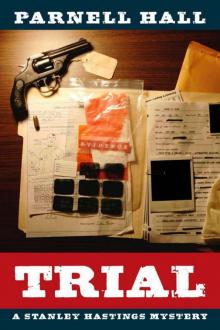 11-Trial
11-Trial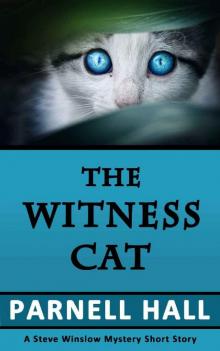 The Witness Cat (Steve Winslow Mystery)
The Witness Cat (Steve Winslow Mystery)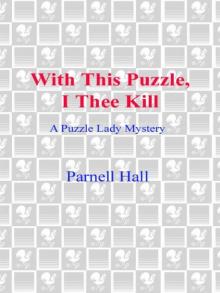 With This Puzzle, I Thee Kill
With This Puzzle, I Thee Kill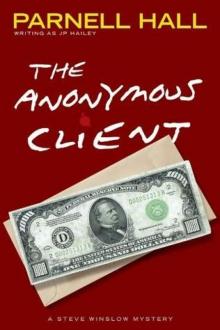 The Anonymous Client sw-2
The Anonymous Client sw-2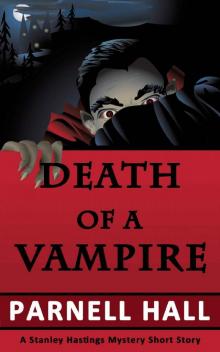 Death of a Vampire (Stanley Hastings Mystery, A Short Story)
Death of a Vampire (Stanley Hastings Mystery, A Short Story)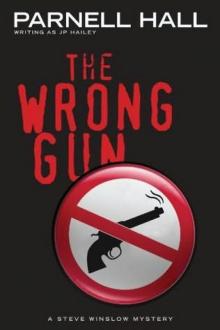 The Wrong Gun sw-5
The Wrong Gun sw-5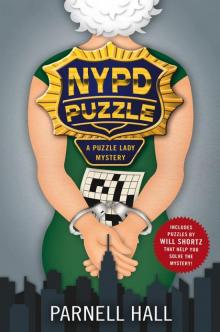 NYPD Puzzle
NYPD Puzzle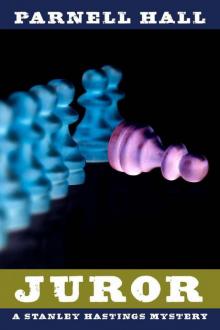 6 Juror
6 Juror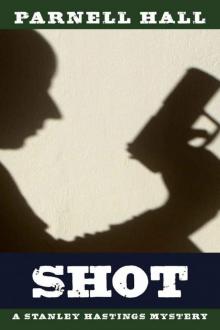 07-Shot
07-Shot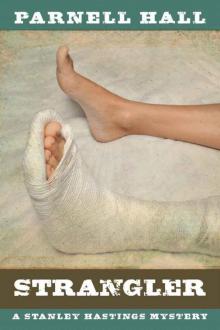 04-Strangler
04-Strangler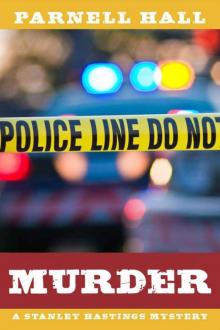 02-Murder
02-Murder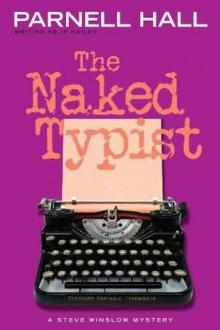 SW04 - The Naked Typist
SW04 - The Naked Typist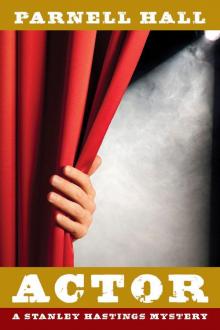 Actor
Actor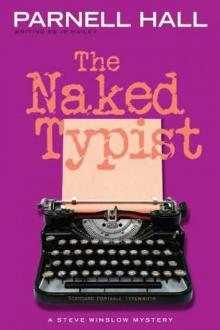 The Naked Typist sw-4
The Naked Typist sw-4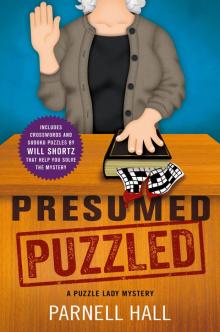 Presumed Puzzled
Presumed Puzzled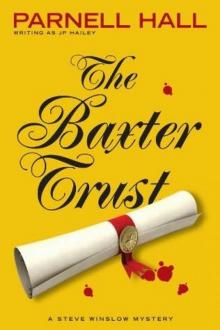 SW01 - The Baxter Trust
SW01 - The Baxter Trust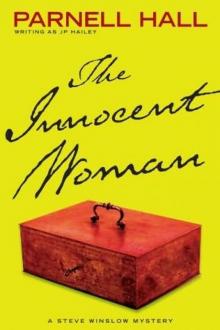 SW06 - The Innocent Woman
SW06 - The Innocent Woman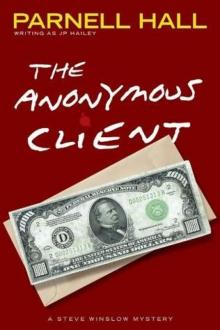 SW02 - The Anonymous Client
SW02 - The Anonymous Client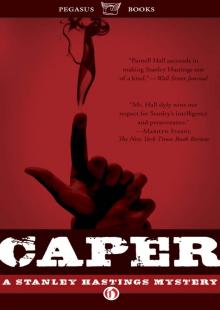 Caper
Caper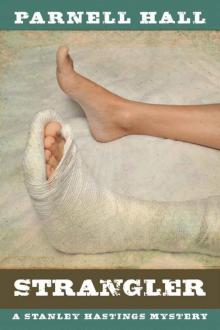 4 Strangler
4 Strangler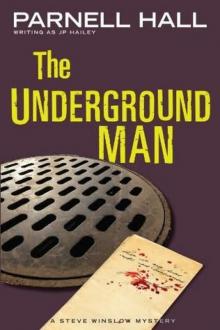 The Underground Man sw-3
The Underground Man sw-3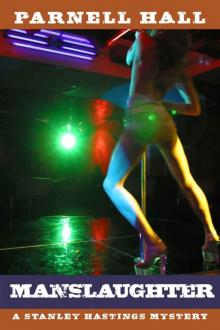 Manslaughter (Stanley Hastings Mystery, #15)
Manslaughter (Stanley Hastings Mystery, #15)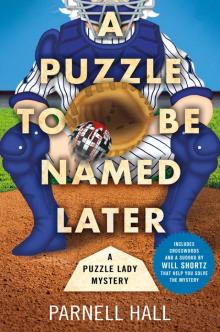 A Puzzle to Be Named Later--A Puzzle Lady Mystery
A Puzzle to Be Named Later--A Puzzle Lady Mystery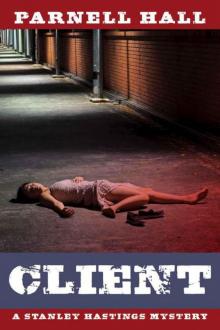 05-Client
05-Client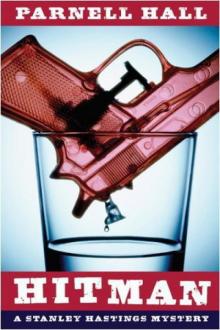 16 Hitman
16 Hitman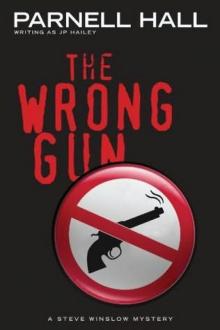 SW05 - The Wrong Gun
SW05 - The Wrong Gun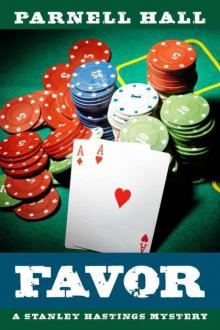 3 Favor
3 Favor Last Puzzle & Testament
Last Puzzle & Testament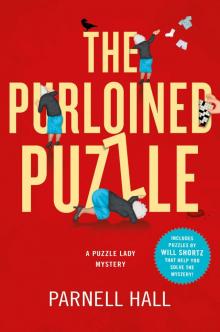 The Purloined Puzzle
The Purloined Puzzle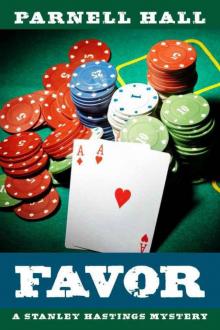 03-Favor
03-Favor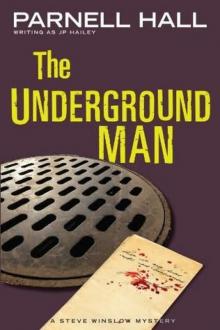 SW03 -The Underground Man
SW03 -The Underground Man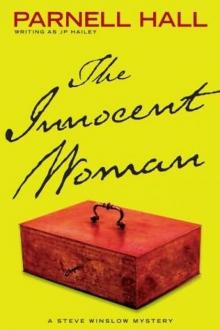 The Innocent Woman sw-6
The Innocent Woman sw-6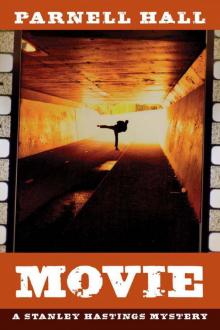 10 Movie
10 Movie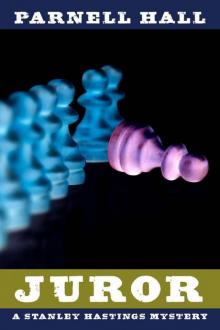 06-Juror
06-Juror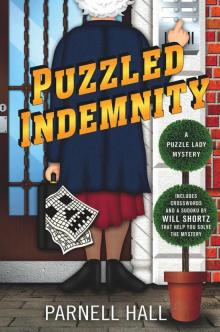 Puzzled Indemnity
Puzzled Indemnity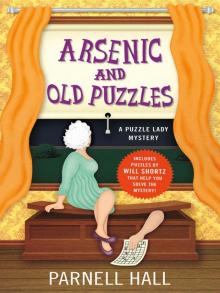 Arsenic and Old Puzzles
Arsenic and Old Puzzles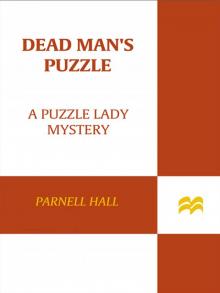 Dead Man's Puzzle
Dead Man's Puzzle Safari
Safari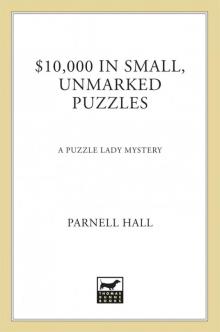 $10,000 in Small, Unmarked Puzzles
$10,000 in Small, Unmarked Puzzles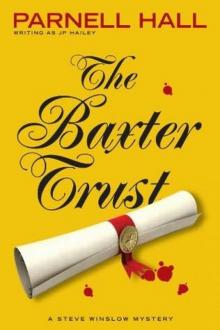 The Baxter Trust sw-1
The Baxter Trust sw-1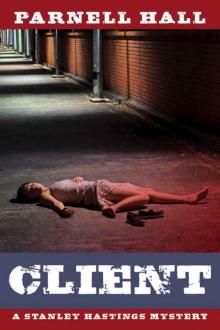 5 Client
5 Client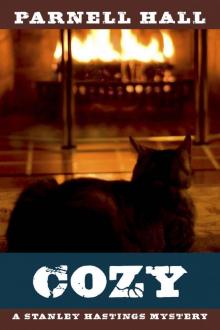 Cozy (Stanley Hastings Mystery, #14)
Cozy (Stanley Hastings Mystery, #14)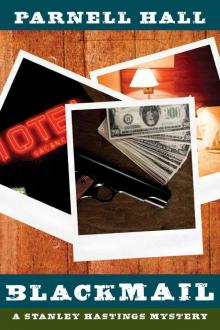 Blackmail
Blackmail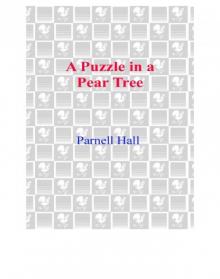 A Puzzle in a Pear Tree
A Puzzle in a Pear Tree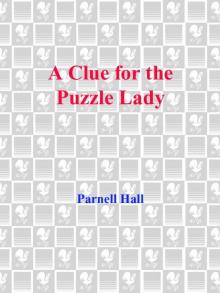 A Clue for the Puzzle Lady
A Clue for the Puzzle Lady Clicker Training (Stanley Hastings Mystery, A Short Story)
Clicker Training (Stanley Hastings Mystery, A Short Story)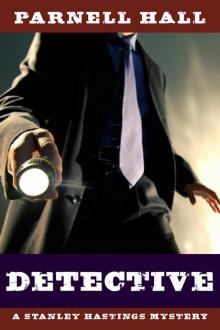 Detective (Stanley Hastings Mystery Book 1)
Detective (Stanley Hastings Mystery Book 1)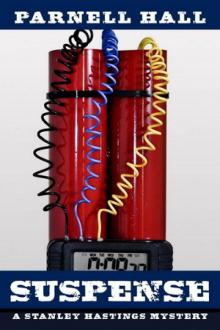 13 Suspense
13 Suspense